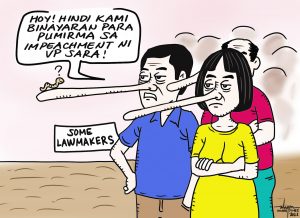BY NICOLE ANOOS & JAMES RYAN DIACOSTA
THE PERIOD of authoritarian rule under Ferdinand Marcos has had lasting implications on the sociopolitical landscape of the Philippines. The lessons learned from this era highlight the importance of vigilance in protecting democratic norms and institutions against potential encroachments. One such
lesson is the critical role of an independent media and civil society in safeguarding democracy. Martial law’s harsh restrictions on the media served as an example of how information control may suppress dissent and affect public opinion. A strong and independent press acts as an advocate in a functioning democracy, exposing issues that impact the general public and holding those in authority responsible.
Therefore, it is essential to uphold and defend civil society organizations’ rights and journalistic freedom in order to ensure that democracy flourishes and to avoid any future leaders from attempting to quell dissent through similar means. The necessity of civic participation and the rule of law are the subject of yet another important lesson. The Marcos administration’s rejection of the rule of law in favor of authoritarian methods is a prime example of how public complacency may cause democratic rights to erode.
It is impossible to overestimate the significance of having an informed and involved electorate; people need to be conscious of their rights and obligations and take an active part in the political process. This entails supporting accountability, openness, and the upholding of laws that safeguard civic freedoms in addition to casting a ballot in elections. The public may build a barrier against the emergence of authoritarianism by encouraging a culture of political participation.
In addition, a sensitive topic in Philippine society is the fight for responsibility and historical justice for the abuses of human rights that took place under the Marcos administration. Reconciliation and healing depend on addressing historical tragedies.
Restoring public trust in institutions and upholding the rule of law can be facilitated by acknowledging victims’ pain and bringing offenders accountable. In order to foster a communal memory that emphasizes the significance of democratic norms and the consequences of their violation, efforts should be made to institutionalize human rights education and commemorate the experiences of people impacted by the Marcos administration.
In the broader context, it is crucial for the international community to recognize the historical trajectory and democratic struggles of the Philippines. Support for initiatives that promote democratic governance, human rights, and anti-corruption measures can help invigorate the efforts of those within the country seeking meaningful reform. Global solidarity can amplify local voices and reinforce the significance of democratic ideals in the face of challenges.
In the long run, what comes from the Marcos administration serves as a reminder that democracy is an ongoing process that necessitates the active involvement and dedication of all societal segments. The Philippines’ fragile democratic institutions highlight the need for constant advocacy, education, and vigilance. The nation must look to its history to build on its current political issues.
_____________________________________________________________________________
Nicole Anoos and James Ryan Diacosta are dedicated 3rd-year political science students with shared passions for democracy and civic engagement. Both are driven by a deep commitment to understanding and strengthening democratic processes, actively participating in initiatives that promote informed citizenship and community participation. Their enthusiasm for political discourse and their dedication to making a positive impact on society make them notable voices within their field.

